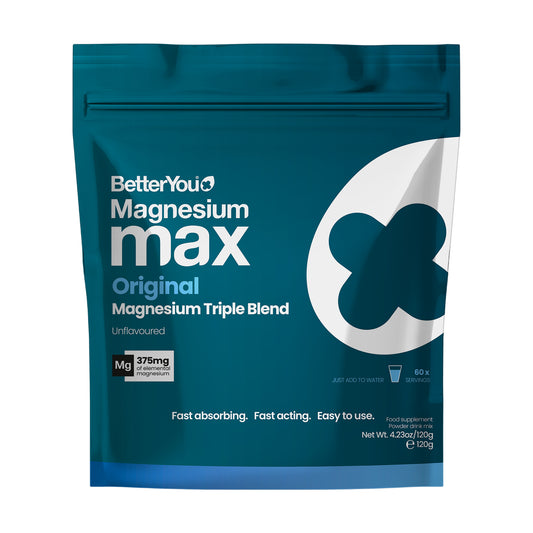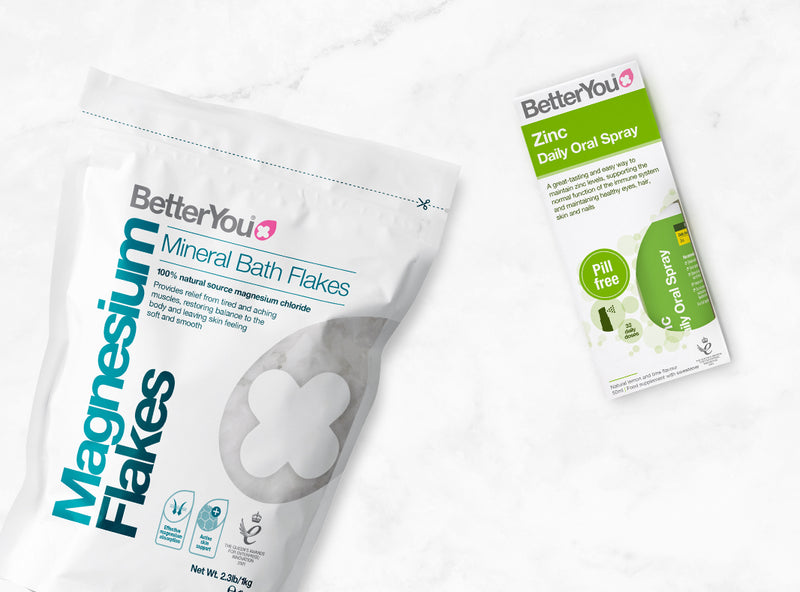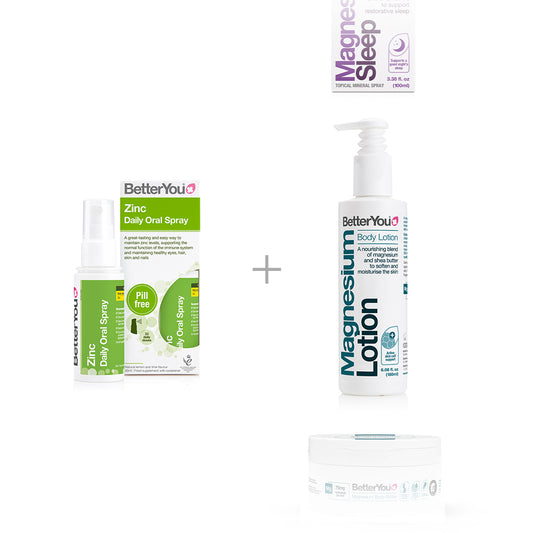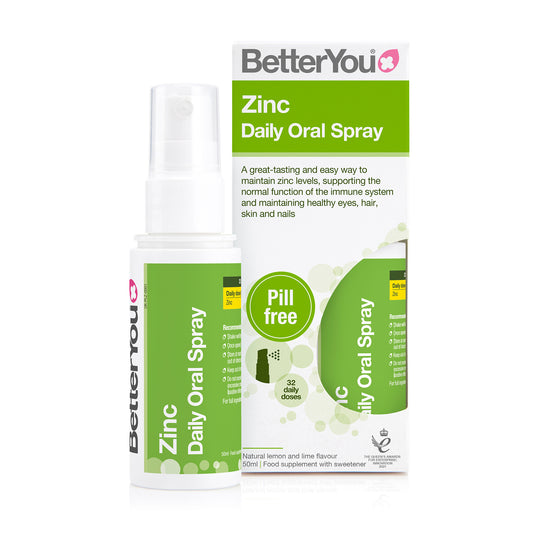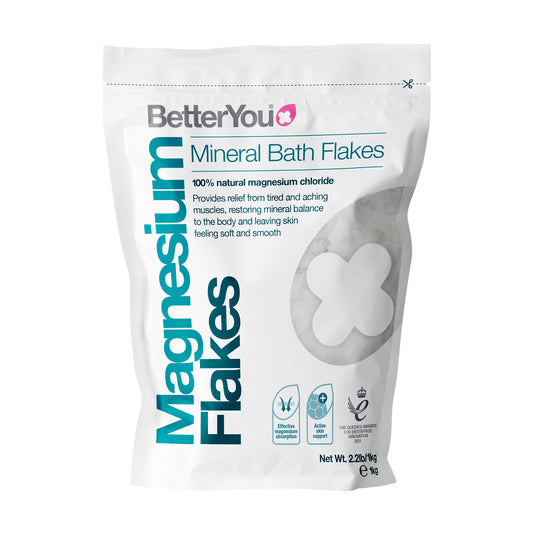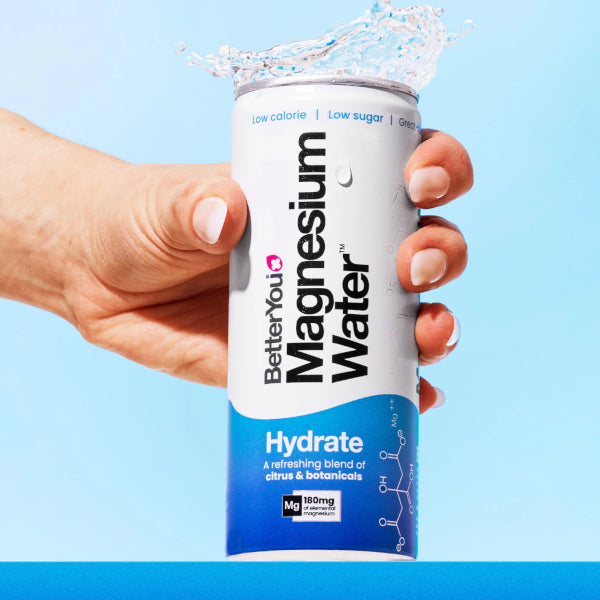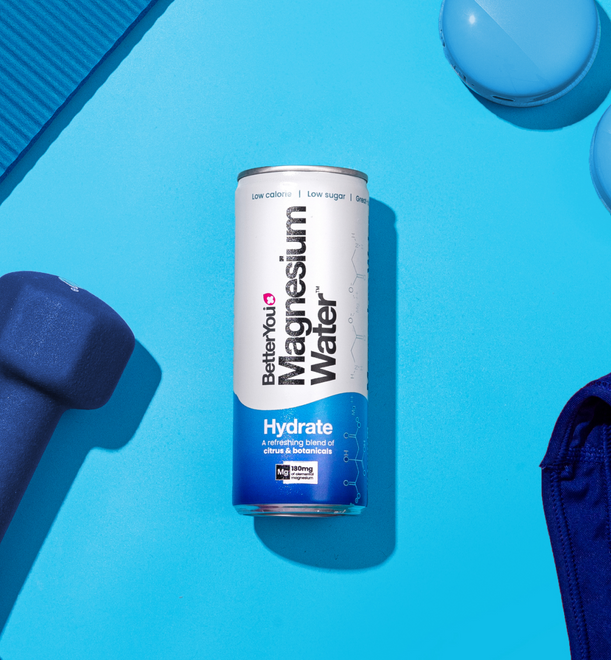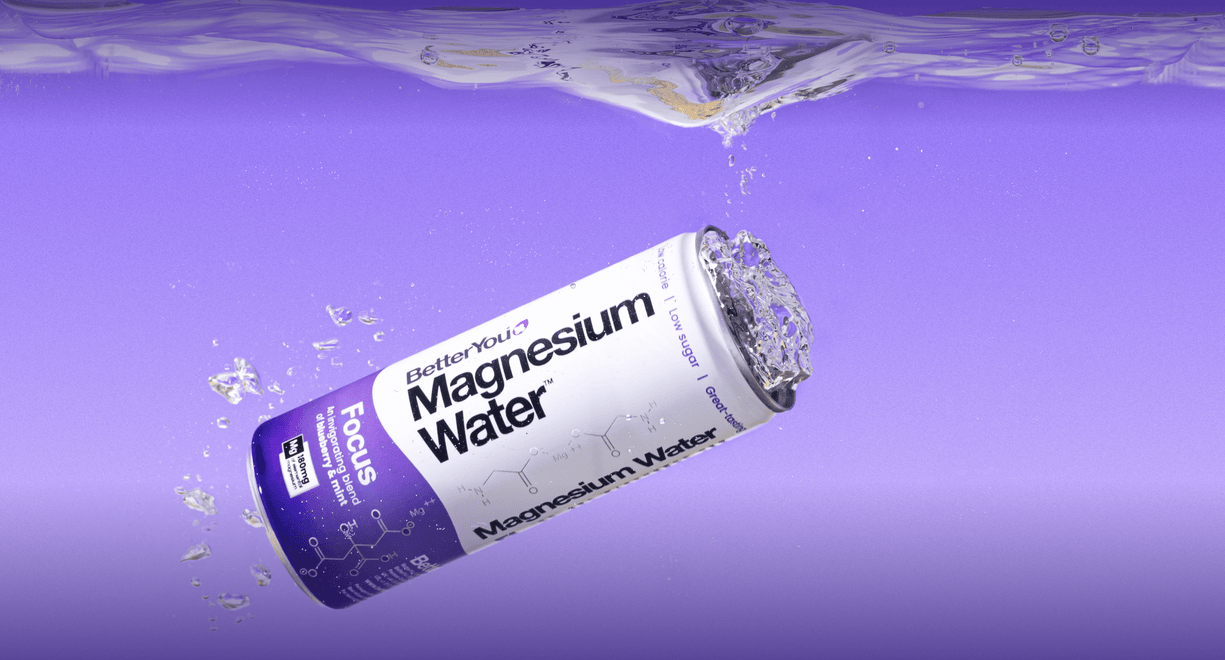In this guide, we explain:
- the benefits of taking magnesium and zinc together
- recommended dosages
- the causes of zinc deficiency and how to avoid it
Click on a link below to jump to the relevant section:
- What is zinc?
- Can I take magnesium and zinc together?
- What are the health benefits of taking magnesium and zinc?
- How much magnesium and zinc should I take?
- How do I know if I have a zinc deficiency?
- Can I take zinc with other minerals and vitamins?
What is zinc?

Zinc is one of the seven essential minerals—the others being magnesium, iron, calcium, iodine, silica and selenium—your body needs to stay healthy.
Although it’s extremely important for your everyday health and wellbeing, your body is unable to store it naturally, like it does with other vitamins and minerals. This is why you need to consume zinc regularly, both through your daily diet and via zinc supplements.
Can I take magnesium and zinc together?
Yes!
All types of vitamins and minerals are in competition, in that they need the right conditions for your body to absorb them properly. Some minerals have mutual benefits, while some only counteract each other’s level of absorption (known as bioavailability).
Taken together, and in the right dosages, magnesium and zinc work to each other’s advantage. In fact, they do this so well that you’ll find a lot of oral supplements (tablets, capsules etc.) on the market that combine the two.
Magnesium helps your body regulate its zinc levels, though it should be noted that high intake of zinc can be detrimental to magnesium absorption and reduce magnesium balance - it will only hinder absorption when taken in abnormally high doses (around 142 mg of zinc per day).
What are the health benefits of taking magnesium and zinc?
Magnesium
There are a multitude of magnesium benefits. It:
- relieves muscle tension
- reduces fatigue
- improves sleep quality
- aids muscle recovery after exercise and sports
- repairs skin, keeping it flexible and supple
- strengthens bones
- contributes to metabolism, the functioning of the nervous system and protein synthesis
Being deficient in magnesium (when your magnesium levels are too low) can make you feel fatigued and lead to more broken sleep.
Read more about the benefits of magnesium in the magnesium section of our Health Hub.
Zinc
Your body needs zinc in order to grow, develop and maintain itself—indeed, this type of mineral is a trace element present in every one of your cells.
The body uses zinc benefits for a number of important functions, including:
- producing enzymes that catalyse vital chemical reactions
- processing protein, carbohydrates and fat in food
- helping to heal wounds
- boosting immune system function
- supporting protein and DNA synthesis
- maintaining bones
- playing a role in the growth and division of cells
Some athletes and professional sportspeople supplement their zinc intake to improve their performance and strength. Zinc supplements are good for muscle tension and tightness too.
How much magnesium and zinc should I take?
Magnesium
For adults, 300 mg (men) or 270 mg (women) of magnesium is the daily limit. For children, the recommended daily doses are lower and depend on age, as the following table shows.
|
Recommended daily dosage, in milligrams (mg) |
|||||
|---|---|---|---|---|---|
|
Adults |
|||||
|
Male |
Female |
||||
|
Age 19–64 |
Age 65–74 |
Age 75+ |
Age 19–64 |
Age 65–74 |
Age 75+ |
|
300 mg |
300 mg |
300 mg |
270 mg |
270 mg |
270 mg |
|
Children |
|||||
|
Male |
Female |
||||
|
Age 7–10 |
Age 11–14 |
Age 15–18 |
Age 7–10 |
Age 11–14 |
Age 15–18 |
|
200 mg |
280 mg |
300 mg |
200 mg |
280 mg |
300 mg |
|
Age 1 |
Age 2–3 |
Age 4–6 |
Age 1 |
Age 2–3 |
Age 4–6 |
|
85 mg |
85 mg |
120 mg |
85 mg |
85 mg |
120 mg |
But that’s only for oral supplements like tablets and capsules—transdermal magnesium supplements (those you apply to your skin) don’t go through your digestive system and so have no upper limit! These can take the forms of magnesium oils, magnesium creams, and even bath flakes. BetterYou's magnesium supplements are formulated using Zechstein magnesium, which is a pure form of magnesium chloride. This can help support your magnesium intake, to help avoid low levels.
With magnesium, you get a good part of your intake by eating a varied and balanced diet full of magnesium-rich foods such as spinach, nuts, beans and wholegrains. However, food sources don’t always supply enough, and if you’re found to have a magnesium deficiency you can boost your dietary magnesium intake with supplements.
Zinc
Your body needs much less zinc than it does magnesium. The recommended daily dosages for adults are 9.5 mg (men) and 7 mg (women), while for children it’s between 5 mg and 9.5 mg, depending on age (see the table below).
|
Recommended daily dosage, in milligrams (mg) |
|||||
|---|---|---|---|---|---|
|
Adults |
|||||
|
Male |
Female |
||||
|
Age 19–64 |
Age 65–74 |
Age 75+ |
Age 19–64 |
Age 65–74 |
Age 75+ |
|
9.5 mg |
9.5 mg |
9.5 mg |
7.0 mg |
7.0 mg |
7.0 mg |
|
Children |
|||||
|
Male |
Female |
||||
|
Age 7–10 |
Age 11–14 |
Age 15–18 |
Age 7–10 |
Age 11–14 |
Age 15–18 |
|
7.0 mg |
9.0 mg |
9.5 mg |
7.0 mg |
9.0 mg |
7.0 mg |
|
Age 1 |
Age 2–3 |
Age 4–6 |
Age 1 |
Age 2–3 |
Age 4–6 |
|
5.0 mg |
5.0 mg |
6.5 mg |
5.0 mg |
5.0 mg |
6.5 mg |
You should be able to get all the zinc you need from a balanced diet. Good sources of zinc include:
- red meat
- poultry
- beans and nuts
- shellfish (such as oysters)
- wholegrains
- cereal products (such as wheatgerm)
How do I know if I have a zinc deficiency?
Zinc deficiencies are quite rare in developed countries like the UK, as it’s easy to get more than the recommended allowance via a normal diet. For this reason, it’s unlikely your levels of zinc are low enough that you should be concerned.
That said, there are certain groups of people who are considered more at risk of zinc deficiency. These include:
- children and adolescents
- adults over the age of 65—due to the body becoming less able to absorb the mineral as it ages
- women who are pregnant may need pregnancy supplements or breastfeeding and may require breastfeeding supplements
- vegetarians and vegans—this is because grains and legumes, major staples of the meat-free diet, contain high levels of phytate that actually reduce zinc absorption
Supplementing with calcium or iron (which compete for absorption) can significantly reduce zinc levels too.
Symptoms of zinc deficiency
People whose zinc levels are too low sometimes experience the following symptoms:
- Weight loss
- Wounds not healing properly
- Reduced sense of smell and/or taste
- Diarrhoea
- Loss of appetite
- Lack of alertness
Detecting a zinc deficiency
As zinc is spread in trace amounts among all the cells in your body, it’s hard to detect a deficiency by doing a standard blood test.
Instead, your doctor will take a sample of your blood plasma, urine or hair and have it analysed. They tend to consider other factors—such as a poor diet, or your genetics—alongside the results of such analyses when determining whether you should be taking supplements.
There are home-testing kits you can buy online. With these, you take a sample of your hair then send it off for further analysis. You receive the results some days later.
Can I take zinc with other minerals and vitamins?
As mentioned above, it’s fine to take zinc with magnesium. However, as zinc can interact with other minerals (calcium and iron, for example) and vitamins, you need to be aware of how combining them can impair your body’s ability to absorb them.
You should avoid taking zinc and copper together—zinc, particularly in high doses, can stop your body absorbing copper and potentially lead to a deficiency. In some people, it can also cause bones to weaken.
If you take calcium supplements, understand that increasing calcium levels can affect your body’s zinc absorption and overall levels. Being deficient in zinc, meanwhile, causes a reduction in calcium absorption and can lead to deficiency.
Related content
Magnesium and vitamin D—benefits, dosages and which types of supplements to take
Magnesium and B vitamins—what are the benefits of taking them together?
